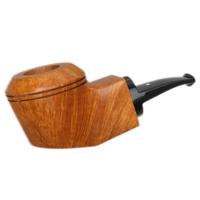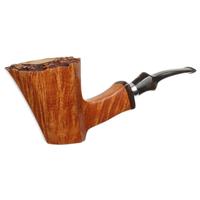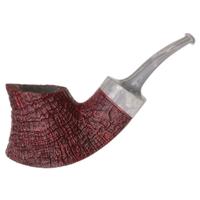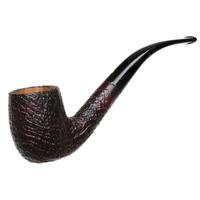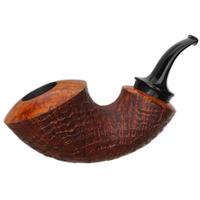Anyone ever try to a make their own version of latakia? Maybe add a huge water pan to a smoker? My wife said she would call it suhthernkia'.
Making Your Own Latakia?
- Thread starter hakchuma
- Start date
You are using an out of date browser. It may not display this or other websites correctly.
You should upgrade or use an alternative browser.
You should upgrade or use an alternative browser.
- Status
- Not open for further replies.
That's an interesting idea. All you need is the correct tobacco(s) and the proper aromatic woods and herbs with which to smoke it. To that end here is a link (What's The Deal With Latakia?) to an article by Russ Ouellette which might prove informative.
Wonder if there any recipes floating about. Re: herbs, I wasn't aware there was anything going on but aromatic woods. Would be interesting to find out. Depending on how much the process costs, may have to do it in volume to make it worth while.... Meaning, it's probably just as expensive to do several hands as it is just a few?
Do places like LeafOnly offer whole-leaf Smyrna?
Do places like LeafOnly offer whole-leaf Smyrna?
I have tried several times to make Latakia. All attempts have failed. For starters no one knows what variety of Turkish was used for Syrian Latakia. The Shek-el-bent variety is just an unsupported rumor that keeps getting circulated via the internet. Cyprian Latakia is pretty much known to be a Smyrna type tobacco although there are some that say it is actually Yayladag.
With that said, the main flavor constituent (from burning the wood of Pistacia Lentiscuc)of Cyprian Latakia is Mastic, comprising about 90% of the creosote. Other minor contributors are Myrtle and Stone Pine.
With that in mind I've tried spraying Smyrna with Mastic Oil. The result was not good. I've smoked Smyrna in a smoker. It tasted like Dark Fired Tobacco. I've also sprayed tobacco with Cade oil aka Juniper Tar. I did this based on the fact that Syrian is smoked with the wood of Juniperus Oxycedrus aka Juniper. It did not taste good.
My last experiment (not yet conducted) is to smoke some Turkish with Mastic Gum. My thought is that the heat would melt the mastic and it would be absorbed into the leaf. I do not have a lot of faith that this will work though.
The trick would be to import some Pistachio wood and burn that in a smoker. The problem with using a smoker though is you need to have some way of adding water (constantly). Without water the leaf turns super crispy dry.
With that said, the main flavor constituent (from burning the wood of Pistacia Lentiscuc)of Cyprian Latakia is Mastic, comprising about 90% of the creosote. Other minor contributors are Myrtle and Stone Pine.
With that in mind I've tried spraying Smyrna with Mastic Oil. The result was not good. I've smoked Smyrna in a smoker. It tasted like Dark Fired Tobacco. I've also sprayed tobacco with Cade oil aka Juniper Tar. I did this based on the fact that Syrian is smoked with the wood of Juniperus Oxycedrus aka Juniper. It did not taste good.
My last experiment (not yet conducted) is to smoke some Turkish with Mastic Gum. My thought is that the heat would melt the mastic and it would be absorbed into the leaf. I do not have a lot of faith that this will work though.
The trick would be to import some Pistachio wood and burn that in a smoker. The problem with using a smoker though is you need to have some way of adding water (constantly). Without water the leaf turns super crispy dry.
Sheesh. Each time I read something like that, I am more surprised at how affordable tobacco really is (for now).
Thanks for the post - very interesting.
Thanks for the post - very interesting.
It has been done to some extant but the main problem is te proper wood. Mastic is the main ingedient and is very slow growing and thus expensive.
"For starters no one knows what variety of Turkish was used for Syrian Latakia. The Shek-el-bent variety is just an unsupported rumor that keeps getting circulated via the internet."
With all due respect, jitterbugdude, two rather knowledgeable people, both master tobacco blenders, have published the following:
from:
"The Book of Pipes and Tobacco"
by Carl Ehwa, Jr.
"Latakia used to be processed from a Syrian type of Oriental known as Shek el-Bent"
from:
"Common Misconceptions About Pipe Tobacco"
by Russ Ouellette
"The tobacco used in Syria is Shek-el-Bint (var.)"
With all due respect, jitterbugdude, two rather knowledgeable people, both master tobacco blenders, have published the following:
from:
"The Book of Pipes and Tobacco"
by Carl Ehwa, Jr.
"Latakia used to be processed from a Syrian type of Oriental known as Shek el-Bent"
from:
"Common Misconceptions About Pipe Tobacco"
by Russ Ouellette
"The tobacco used in Syria is Shek-el-Bint (var.)"
Dino, No disrespect taken. Keep in mind that just because someone is an expert in his field, in this case being a blender and a pipe smoker does not mean he is knowledgeable in all things tobacco related. I could take my car to have the rotors replaced by a certified mechanic. He may know all about how the rotors were made and the history of rotor development but I would not expect him to know what percentage of the metals were body centered cubic(bcc) or face centered cubic(fcc), or for that matter what BCC /FCC means.With all due respect, jitterbugdude, two rather knowledgeable people, both master tobacco blenders, have published the following:
from:
"The Book of Pipes and Tobacco"
by Carl Ehwa, Jr.
"Latakia used to be processed from a Syrian type of Oriental known as Shek el-Bent"
from:
"Common Misconceptions About Pipe Tobacco"
by Russ Ouellette
"The tobacco used in Syria is Shek-el-Bint (var.)"
The pipe world runs on a lot of misinformation, some of which benefits sellers. One of the myths that has recently been put to bed (I think) is the myth that only "real" Perique must be made in St Jame's Parrish. So too there are a lot of myths about Latakia.
In my quest to make my own Latakia I have accumulated a lot of research papers on seed variety, harvesting methods, curing, fermenting and wood varieties for smoking the leaf. I will try in the next day or two to put some of my notes into a readable form and post the information.
I've given thought to home brewed latakia. While pinnning down "true" lat may be difficult for those not in the Mediterranean, if a reliable smoking technique can be identified, nothing is stopping us from making regional smoked leaves using what we do have available. Maybe the mad scientists in the group can share notes and we can all learn what works and what doesn't.
Exactly sthbkr77, that has been my thoughts. Why try to copy? Why not develop something new? I could give a fig about making Syrian or the plentiful Cyprian. I want to compare some Florida Latakia to some Michigan. That's when we know that the hobby is going strong.
Cosmic, I was having the same thought. Can we reproduce the Latakia that we love? Maybe. Why, though? If one loves Latakia, why not try to make a new, different Latakia that may be a wonderful condiment to our own blends. This whole thread has me wondering what a cherry wood smoked oriental tobacco could turn into.
Good! Good! Great to hear that at least some few others are thinking past what the market offers. Tobacco will never die. How do you think Latakia (or Perique) were invented? By accidents leading to endless experiments until they found something that worked.I have tried several times to make Latakia.
If you start with what you best know to be similar to what they might have had and keep trying what you think they might have tried, somewhere out there you will find a similar interesting result. Maybe not identical, but as others have said, so what? Who is to say that some variant of the process going into Latakia or Perique might not be equally good, intriguing and different? And guess what? It will be YOURS.
I don't see why such experiments cannot be carried out on a small scale at first and when a promising result is achieved, ramped up.
It utterly bores the snot out of me to read people only talk about the availability of this or THAT blend as though it can never be replaced. Nothing ever made is ever totally lost--- it only awaits rediscovery.
I love to hear when people take chances on something new, undiscovered tastes, like Russ working with Mark Ryan on making a fermented Virginia using the perique process. Treating our taste buds to undiscovered territories. I love it.
Yes! But let us not just wait for the big expert blenders to have all of the fun! They have more time, resources and knowledge, but if even only 100 private people do their own experimentation, that greatly multiplies the chances of something great. Many of the greatest discoveries in history were ACCIDENTS that happened while not even looking to do what they ended up finding.
I suspect if you try to make your own "improved" version of Latakia all you will end up with is something akin to Dark Fired Kentucky. I've had 2 samples from people that smoked leaf attempting to make Latakia and they both were very similar to dark fired. The taste of Latakia seems to be all in the wood used to smoke it.
- Status
- Not open for further replies.



